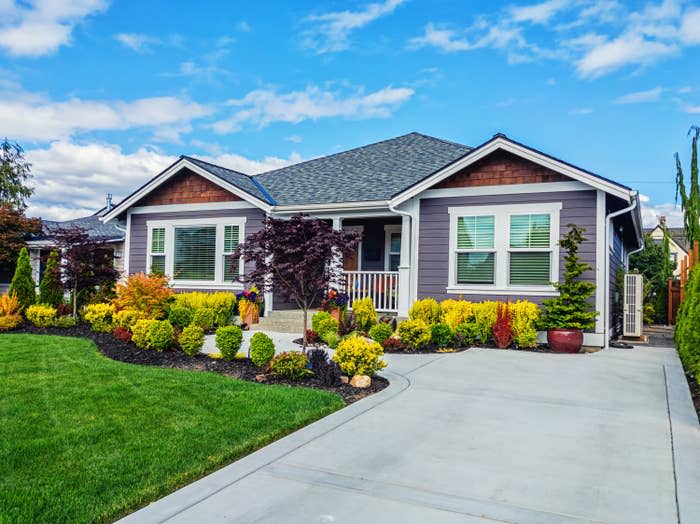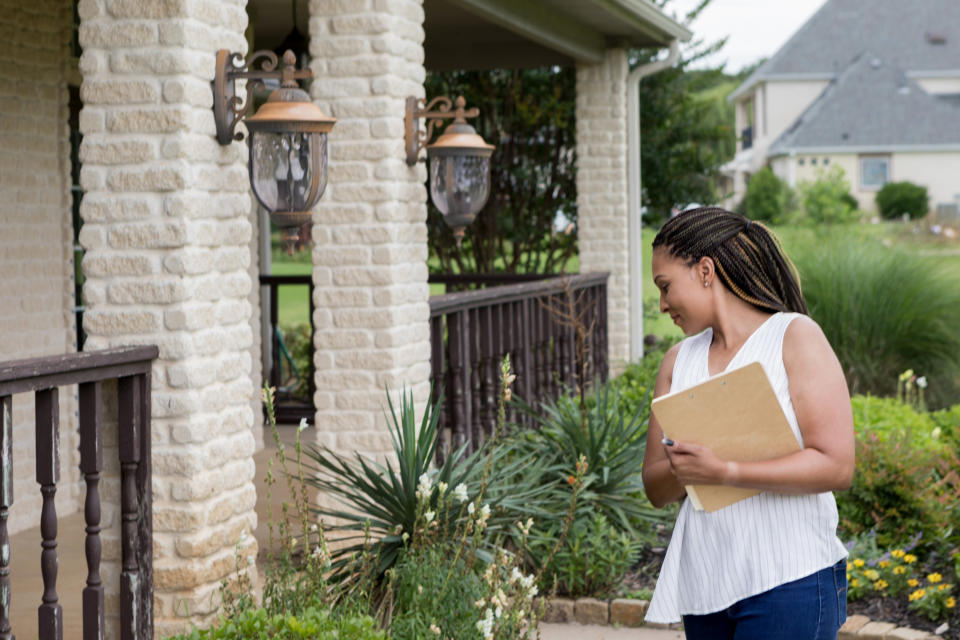8 Things That I Learned When I Settled On A Starter Home Instead Of My Dream Home
Three years ago, my husband and I bought our first home. I had always wanted to be a homeowner, and it seemed like a great time to buy. Interest rates were low, and there were plenty of options in the market, but still, I knew from the start that we weren't looking for our dream home.

Instead, we went for a starter home and settled on a three-bedroom, ranch-style home in an area we were very familiar with.
A starter home is usually a smaller, more affordable home that first-time buyers may choose to help them get used to homeownership. The main idea behind getting a starter home is that you can possibly save money on the purchase price and make a smaller down payment as a result — which was perfect for us, since we were in our twenties and didn't have a huge down payment to work with anyway.
Some people say that buying a starter home is not worth it, but if I had to make the decision all over again, I'd happily make the same choice. To help you figure out if a starter home could be right for you, I'm sharing the eight lessons that I learned from mine.
Financial advice is definitely not one-size-fits-all. What's worked for me may not work for you. And given our current wild housing market, you might want to wait until prices cool down a bit to begin your homeownership journey.
1. Starter homes are generally less expensive, so choosing one made it easier for us to qualify.
NBC / Via giphy.com
Before we bought our home, I heard all these horror stories from homebuyers about how difficult the process was. I was worried about being self-employed and running into issues with calculating and verifying my income.Luckily, the process for buying our home went smoothly, and I believe the fact that we chose a starter home helped. Starter homes are naturally less expensive, so my husband and I were able to qualify given our income and savings.Choosing a starter home also made it easier for us to stay below the debt-to-income ratio (DTI) threshold. While I had already paid off my student loans, my husband still had student loan debt and a car loan.Your DTI ratio is calculated by adding up all your minimum monthly debt payments (credit cards, student loans, personal loans, etc.) and dividing it by your monthly income. Lenders place a big emphasis on your DTI because they want to make sure you can afford to pay your mortgage along with all your other debts each month.So, with a lower potential monthly mortgage amount for our starter home, we were able to keep our DTI below the 43% limit that most lenders look for.
2. But a starter home is a trade-off. I had to settle for missing out on some features that I really want in my dream home someday.
Realtor.com / Via giphy.com
Of course, when you buy a starter home, the trade-off is you're not getting your dream home. Your dream home likely has everything that you want and more, but we gave up a lot of preferences on our list when we bought our starter home.We really wanted a basement, but our ranch-style home doesn't have one. Walk-in closets and an open concept were also on my list, but they just didn't make the cut.However, the trade-off is that we saved a significant amount of money by buying a smaller home. We were able to make a decent down payment and build equity while getting used to being homeowners.
3. DIY skills are sooo helpful when you get a starter home. We're not super handy, but luckily our families helped out.
Reuben Armstrong / Via giphy.com
Starter homes are often smaller and older. This means that you're bound to have something to fix up or repair. Having some DIY skills can be super helpful in saving you money when it comes to those expenses.That said, my husband and I are not good DIYers. We can only do basic things, but we made sure to keep a list of friends and family who could help us. For example, when we first bought the house, I knew I wanted to tear out all the carpet. Luckily, my dad knows how to put flooring in and helped us with this entire project.Then, my father-in-law helped us do a small remodel on our half-bathroom. My husband and I also taught ourselves how to add a backsplash in our kitchen, and it turned out amazing.By DIYing a few fixes, we were able to get so much done during the first few months and save literally thousands of dollars.
4. But you probably won't be able to DIY everything, so a maintenance and repair budget is a MUST.
Channel 9 / Via giphy.com
Another lesson I learned was that even if we can DIY some things, we still needed to budget for maintenance and repairs. For example, I liked how the sellers provided us with a 14-month home warranty when we bought the house. Unfortunately, it didn't cover everything. Within the first year, we had a major plumbing issue that cost us $1,800 to fix. We also knew that there were some foundation issues with our home when we bought it. The crawl space was retaining water and mold. This was a $2,000 fix at minimum.Then, there were tons of trees that needed to be trimmed and removed. Tack on another few hundred dollars. When it came to appliances, we also had to replace our stove and washer during the first two years.We're getting through these costly expenses by working home maintenance costs into our budget. Most months, we set aside $100 no matter what. Other months, we can afford to save more. We also took advantage of payment plans, especially for the foundation repairs. This allowed us to space out the costs and avoid draining our emergency fund.
5. Looking at our home inspection report more carefully and negotiating with the seller could have cut down our repair costs a lot.

You probably knew this was coming. Whenever you want to buy a home, you'll generally pay a licensed inspector to come look at the property. The fee for this is usually around $500, but it's worth it because the inspector can find any issues with the home that you might have missed or just didn't realize.
From there, you can go back to the sellers and either renegotiate the home price or ask them to fix the issues before moving forward. Our inspector found the foundation issue as well as a few other things when looking at our home.
His report was several pages long, and we did ask the homeowners to make some fixes. However, I wish we would have reviewed the report more thoroughly and negotiated more with the sellers. Similarly, in our current wild housing market, many buyers are skipping inspections altogether to win their new homes, only to regret it later when they discover issues with the house.
It is a trade-off, and likely everything that shows up on the report won't get fixed by the sellers. But we definitely could have pushed a little more on our end and saved some money on the repairs we made in the future.
6. I'm very glad we left some wiggle room in our budget to help us cover mortgage increases.
youngmunchkin.tumblr.com / Via giphy.com
One of the key reasons why we chose to buy a starter home was so we wouldn't be overwhelmed by our house payment. Yes, there are so many benefits to buying a forever home, but I knew it wasn't the right time for my husband and me.With us still having some debt and not being in the peak of our careers, it was important to keep enough cash flow in the budget. Since 2018, our mortgage payment has increased twice. They haven't been big increases, but they're still noticeable since property taxes in our area have gone up.I'm glad we chose a home that we could comfortably afford, so there was wiggle room when the mortgage increased, and it wasn't a strain on us financially.
7. Our home's value has already gone up, so it's been a great investment for us so far.
Rocket Mortgage / Via giphy.com
Starter homes can be a great investment due to the fact that they are always in demand. They're more affordable, and you can do a lot of updates on the home to get a good ROI (return on your investment).
Earlier this year, we spent around $5,000 to remodel our main bathroom. Kitchens and bathrooms are major selling points for homes. According to Block Renovation, bathroom remodels can provide an ROI of anywhere from 64% to 72% on average.
And I'm convinced that removing the carpet and adding wood flooring throughout our home also raised the value. For every project we took on to make our home more comfortable, we kept the impact on the home's resale value in mind.
To top it off, if you purchase your starter home in a good area, the property value will likely increase each year as well. Like most places right now, our area has experienced tremendous market growth. According to Zillow's estimates, our home is worth $43,000 more than we bought it for. That's after just three years and doesn't even include the value we've added by fixing up the inside.
8. Owning a home can be a lot of work, but I'm so glad we made the leap.

Even though there have been some frustrations during the past few years, I don't regret buying a starter home. I think people should be careful when considering a starter home and really think about the potential future value as well as any immediate problems they could be taking on when they decide to put an offer in.Yes, in some cases, a starter home or fixer-upper can be a huge money pit. On the flip side though, it can be a good investment for your future plans.My husband and I would love to get into real estate, and we've thought about renting out our starter home one day. Another option would be to sell it and use the profit to go toward a down payment for our dream home. Either way, we're building equity and taking good care of our home so that we can sell it for a good amount whenever we're ready.
Would you buy a starter home? Why or why not? Tell me what you think in the comments!
And for more stories about life and money, check out the rest of our personal finance posts.

